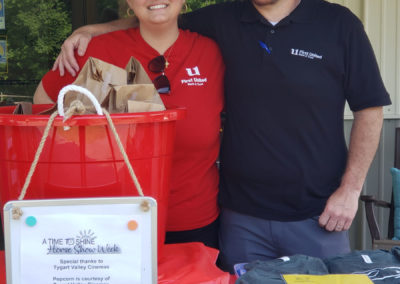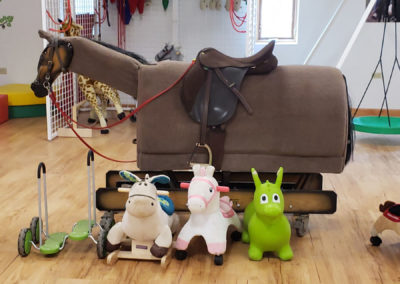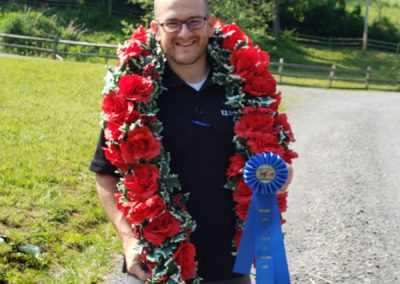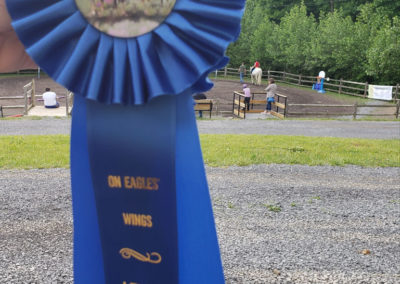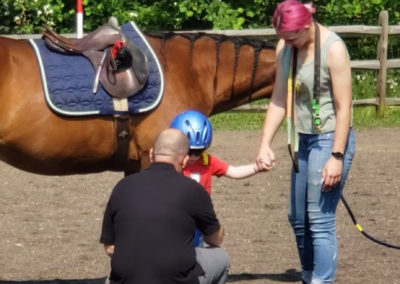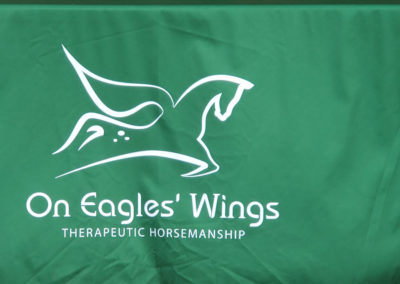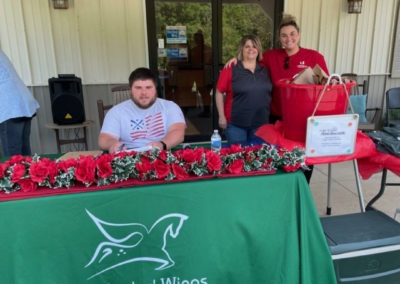
Community Episode – On Eagles’ Wings
Transcript
Announcer: Welcome to the “What Matters Most” podcast, presented by First United Bank & Trust. That’s my bank. Visit us today at mybank.com.
Eric: Hello, and welcome to “What Matters Most,” the podcast all about finances, community, savings, and security for you, your family, and your business. This podcast is brought to you by the helpful folks at My Bank, First United Bank & Trust. I’m your host, Eric Nutter. And in today’s episode, “What Matters Most” is community. And for this discussion, I’m thankful to be joined remotely today by Casey Conaway, the director of development at On Eagles’ Wings, an equine therapy facility in North Central West Virginia. Hey, Casey, how’s it going today?
Casey: Hey, Eric, I’m doing well. Thanks for having me on the podcast.
Eric: I so appreciate you coming on here. And thank you for joining us. I’m excited to have this conversation because, you know, in our weekly podcast, we talk a lot about finances and a lot about different ways people can help themselves from saving and security. But what we don’t really talk about as often are some of the helpful groups in our community that help the community at large and you do that and the bank had been able to get involved with it as well. And so, I wanted to have you on here and talk a little bit about On Eagles’ Wings. So, tell us a little bit about what On Eagles’ Wings is all about.
Casey: Sure. I’d be glad to. We are On Eagles’ Wings, we have nothing to do with birds and everything to do with horses.
Eric: Horses. Okay, got it.
Casey: So, we are a PATH Premier Accredited Therapeutic Horsemanship Center. And let me just briefly kind of go over what that means PATH Premier Accredited. PATH stands for Professional Association of Therapeutic Horsemanship. And Premier Accredited means that our standards and procedures have been evaluated and inspected by that professional association. Because as you can imagine, when you’re moving individuals around with horses that weigh 1,000 pounds, there’s a little bit of safety considerations to make. And so, we take that pretty seriously here and having that accreditation through a professional association has been pretty important to us. But what do we do? We are a nonprofit organization. We started out on the home farm property of our executive director, our executive director’s a lady named Carol Petitto. And what she did in 2007, she had a vision to somehow partner with the healing power of horses to help human beings.
Eric: That’s awesome.
Casey: And so, she started with two horses and five participants in her backyard. And here we are now in our own facility. We’ve been here in the current location, we’re between Fairmont and Morgantown, West Virginia. We’ve been here in our current location with an indoor and outdoor arena since 2016. And that’s pretty significant when I say indoor and outdoor arena because an indoor arena has allowed us to provide services year-round.
Eric: Yeah, for sure.
Casey: And that’s really been important in terms of…
Eric: The weather, you never know.
Casey:… continuity of care. Say it again.
Eric: I said the weather you never know around here.
Casey: Exactly. Exactly. We have a weather alternative because some of the services that we provide are a bit of a lifeline to our participants. The way that we utilize the healing components of a horse, they vary. We have what’s considered therapeutic riding, which is adaptive riding under the guidance of a certified therapeutic riding instructor. And when I say adaptive, it’s a custom riding experience designed to meet the needs of that particular rider. Because we do work with individuals with disabilities and those disabilities can range from a physical disability, a cognitive, a psychosocial. So, everything that we do here is pretty individualized and customized to the needs of our participants.
Eric: Wow. Wow. So, like, do doctors recommend their patients come here? Or how do people find out about horsemanship therapeutic?
Casey: That’s a great question. We have had some local health care providers visit and find out what we do and refer individuals that way. We’ve had social workers, school systems. We do have a program called Hippotherapy, which is using the muscle movement of a horse as a treatment strategy in physical therapy. So, then we get into the physical therapy network, and we have physical therapists that work here two days a week, and they are connected with the Birth to Three Early Intervention Program.
Eric: So, the process, what does the process look like? I mean, the person comes on-site and they ride the horse, or do they just spend time with the horse? How does that work?
Casey: Well, again, that’s another something that’s customized because it looks a little different for all of our participants. But let me walk you through, let’s say we get a phone call. A parent calls me and says…and I’m going to use the example of a child. But we also work with adults too. But for talking this through, I’ll say a parent calls and says, my son or daughter has been diagnosed with disorder X, or we’re seeing this disability present itself. The first thing we do is say, just come and visit. Just come and visit, check out our facility, let the future applicant meet the horses, meet our staff. And then we go from there. And usually, after a visit, somebody sees, hey, this is going to be a good fit for my loved one, and we talked through what the application process looks like.
There is a paper application that requires a physician to sign off. Because again, it goes back to safety, we have to make sure that in any particular situation, a participant will be safe for therapeutic riding. If there’s a condition that’s contraindicated for therapeutic riding, we look at other options. And that you may hear the term ground lessons, that’s working with someone on basic horsemanship skills with your feet on the ground. So, that’s the care for horse, grooming, brushing, leading, how to interact with a large animal. So, unfortunately, right now, fortunately and unfortunately, we are running a waitlist on our applicants, which is heartbreaking because we want to be able to service every single person that applies. But you know, that’s part of why I’m so thankful to be invited in your podcast, because when you talk about community mattering, what matters most community, you know, we need the community to help us grow and be able to serve more participants.
Eric: Yeah. Well, how can people help? What are you looking for?
Casey: I usually answer that question in a three-prong approach to that. We’re looking for time, talent, and treasures. And by treasures, we are a nonprofit organization and it does take money to buy hay and grain and feed and care for horses. You know, it just takes money to run a facility. It takes money to train and employ certified staff. So, we are very thankful for financial donations. Talents, we are so grateful when people say, “Hey, I might not be a horse person, but I’m really good at gardening, can I put in that flower bed for you?”
Eric: Nice.
Casey: And time, on a farm, the list of chores goes on and on. So, we have folks that just come and say, “I’m going to sweep out your tack room today.” And we have people that just show up to weed it and, you know, that sounds simple. But what an encouragement? Because it’s the community saying, I see you, and I support what you’re doing.
Eric: That’s so cool.
Casey: It is cool. Then we also need volunteers in a therapeutic riding lesson. We have a certified therapeutic riding instructor, but depending on the needs of the participant, we may have a volunteer serving as a horse leader. And if someone’s physical limitations are such that they’d struggle with balance, we may have a side walker on the right and one on the left. So, that’s three volunteers just to make one lesson be safe. So, side walkers are truly a picture of the community literally coming alongside of you and giving their time.
Eric: That’s so awesome. And so, do you accept, I mean, basically, anyone calls up and says, “I want to help.” You’ll find a way to get them in there?
Casey: Right. Well, and the first thing we do is say come visit. Absolutely. We’re so thankful. Come visit, check us out. Maybe observe a therapeutic riding lesson, see what a side walker does. And then we have a volunteer application process, too, because it goes back to our accreditation and our safety standards. We do provide training to all of our volunteers.
Eric: Nice. Okay. That’s great.
Casey: So, folks don’t need to feel intimidated. If you’ve don’t have a lot of experience around horses. That’s okay. We specialize…
Eric: You show them how.
Casey: Absolutely. Absolutely.
Eric: Well, we had a group of folks from some of the Morgantown offices come over and help out and some of the photos were just adorable and seeing them walk around with the horses and things, it was really touching to see that.
Casey: Well, you know, that was last week. And if you don’t mind, I’d like to share with you what that did for our staff.
Eric: I would love to hear.
Casey: Last week was A Time to Shine Horse Show Week. And so, we turned all of our weekly horsemanship lessons be it riding or ground lessons, into basically miniature horse shows for our participants. It started out that way that we would do everything individualized over a week instead of one big event because of the COVID. But we’re gonna keep it that way, even when COVID finished because to give each person, each participant individual time was just the right thing to do. However, a major, major undertaking in terms of programming, and the amount of work and support to keep that going for a week. And on Wednesday, last week was hot in North Central West Virginia. Our staff was getting weary, and our regular core volunteers had been working hard for three days straight. And it was like the reserve unit showed up with First United Bank shirts. I mean, I was like, “Oh, backup has arrived.” And so, not only was the fact that we had employees from First United Bank helping us with what needed to happen, keeping the water coolers stocked and bagging up the popcorn, the local movie theater in Fairmont, donated popcorn for us to have extra things to make our participants feel special and it was a real show. So, it was the tasks the First United Bank folks did, they were welcomed and they were needed. But there’s something about presence, physical presence from the community. And it was like, My Bank was just coming to say, “We’re with you. We’re with you.”
Eric: Yeah. That’s cool. Well, I can tell you that just some of the comments that I heard from staff that participated, I mean, the words like heartwarming, fulfilling, you know, truly amazing experience. There was so many of those kinds of comments. So, I mean, I think it worked both ways. It was touching to them too.
Casey: Yeah. I was just getting ready to say it sounds like we’re describing a mutual exchange.
Eric: Yeah. Exactly. Exactly. So, tell me a little bit about how many horses do you have?
Casey: We have 14 therapeutic horses in our herd here, and then we have 14 horses of various breeds gates. That’s the way they walk in sizes to meet the different needs of our participants.
Eric: I was gonna say there are definitely different sizes because I see one little guy here with red tennis shoes on, and he’s about as tall as a three-year-old.
Casey: Well, I think you’re probably describing Stormy. And we’re actually in a building project right now to… We have 14 full-size therapeutic horses. And then we have four miniature horses who right now are housed on private farms because we didn’t have a location to keep them safe and separate from the full-size horses. They’re going to be moving to our location, we’re gonna have all the horses in one spot. But our miniature horses are pretty special because they can be our face out in the community. The miniature horse that you’re describing can actually, well, she does, ride in the back of a Honda CR-V. So, I don’t know if you’ve ever gone down the road and seen a miniature horse in the hatch of an SUV, but it’s quite the experience.
Eric: Well, now I know that it’s Stormy.
Casey: Now you know. But let me tell you where she’s going because we have to stay in line. Our miniature horses have to stay in line with the overall mission of On Eagles’ Wings, and that’s the offer people equine-assisted activities and therapies. So, the specific mission of our minis is literacy, care, and compassion. And so, those minis have been able to help us reach out further into the community…
Eric: So, they go into schools?
Casey: …with school visits, school visits, and that’s the literacy piece. Our miniature horses are fantastic listeners. And if a kiddo’s having some trouble with reading, men or man can practice in your reading to a non-judgmental, unconditional accepting miniature horse really, really help.
Eric: Well, I mean, even if you’re not having trouble reading, I just want to read a horse.
Casey: Right. Exactly. Exactly. And then the care and compassion piece our miniature horses, you mentioned that those little shoes. Our miniature horses do wear tiny shoes, and they come from Build-A-Bear. So they’re just as cute as could be. And that allows them to walk inside buildings without falling.
Eric: I got it.
Casey: And that’s significant in terms of visiting hospitals and nursing homes. That’s the care and compassion piece into the community. Now, granted pandemic-related limitations really limited our visits. And last year, we had to do a lot of walking around the exterior of nursing homes and waving through windows.
Eric: Right. Right. So, donations of Build-A-Bear shoes are accepted?
Casey: Well, yeah or…
Eric: Or are they custom?
Casey: Yeah, there is a size that has to be ordered. But I appreciate what you’re meaning about this question about clarifying donations because that’s a big piece. How can I say this without sounding money hungry? It’s okay to talk about money on a bank podcast? Isn’t it?
Eric: Absolutely. Absolutely. Well, and I think where you’re heading with this is that, generally speaking, donations are…you appreciate donations, but in the end, the easiest thing to do is get cash so that you can then decide what is needed at that time, right?
Casey: And that’s exactly it. Because our therapeutic herd consists of 15 different horses, all of which who are older, they’re all on very specific diets.
Eric: Got you. So the food needs are extensive, and so needing to put the money towards the right thing at the right time.
Casey: Exactly. Exactly. And specific. And so, we’re just so thankful for cash donations that give us the flexibility to purchase the most needed items.
Eric: Right. Excellent. Well, so, Casey, we’re recording this in early June, but this episode won’t release until sometime in July. But do you have any upcoming events in late July or later in the summer that you can share with folks?
Casey: Yeah, early fall, it’s going to probably be the second weekend in September, we’re going to have what we call the On Eagles’ Wings Jamboree. And that is an open house to the community. And it’s typically a Sunday afternoon, and we say, hey, come over, see our facility, learn a little bit more about what we do. Because it does take time to kind of wrap your mind around how does it work to connect horses and humans? And, you know, Eric, we’ve been talking here for, I don’t know, 10, 15 minutes, and I haven’t even touched on our equine-assisted learning and mental health programs.
Eric: Oh, yeah. Yeah.
Casey: So, it does take time to kind of get a feel for all that’s available through therapeutic horsemanship. So, we would just love for folks to come visit us, check out the jamboree, start to learn more about what we do because we need… The more folks who understand that just that many more ambassadors in the community that can help us have, I started to say a bigger footprint in helping people, I probably should say, a bigger horse print in helping people.
Eric: You got to stay on brand.
Casey: Right. Exactly. Exactly.
Eric: That’s so amazing. I’m so thankful that On Eagles’ Wings exists. And thank you for what you do in the community and for helping people. It’s so inspiring. And I appreciate you and thank you for coming on here today. Is there anything we haven’t touched on that you want to talk about a little bit more with our audience?
Casey: I think we covered it. I think the big thing I would want to leave folks with is if you heard something in this podcast and you want to know more about it, reach out. We are so eager and happy to give folks tours and receive visits. We do need to know folks are coming so we make sure we’re ready.
Eric: Are there specific times, like, times that you’re open? Or is it always call ahead?
Casey: It’s both. We’re typically here 9:00 p.m to 8:00 p.m Monday through Thursday, and we have evening hours to accommodate participants that either work or go to school during the day.
Eric: Got you.
Casey: But if something’s been canceled, we do go home in the last lesson, you know if we finished at 7:00, that’s why I tell folks please call because we just want to make sure we’re here. And then we’re open 8 to 5 on Friday, but our contact information is on our website. And that’s going to be oneagleswingswv.org. And then we also have a Facebook page On Eagles’ Wings Therapeutic Horsemanship. That’s how we can be found on Facebook.
Eric: Excellent. Yeah. Well, and we’ll link to the website in the show notes and in the posts that we make about this episode. So, Casey Conaway, director of development at On Eagles’ Wings, thank you so much for joining me today. I really appreciate it.
Casey: And my pleasure, thank you for the invitation.
Eric: Sure thing. Well, that brings us to the end of our show. You can always find more episodes by visiting mybank.com/podcast or find us on your favorite podcast app. You can also leave feedback, ask questions, or request a topic for us to discuss by sending an email to podcast@mybank.com. Thanks again for listening. We’ll be back next week with more helpful content. But until then, we wish you the best in focusing on what matters most to you.
Woman 1: Do I have enough money to retire?
Man 1: Is my family protected if something happens to me?
Woman 2: Is my plan getting me where I’m going?
Child: Are you ready if I want to be a doctor?
Man 2: When it comes to money, we all have questions. That’s why First United Wealth Management has a team of experts ready to listen and provide solutions. First United Wealth Management.
Singers: First United, my bank for life.
Man 2: Member FDIC
Eric: This recording is for informational purposes only. Any references in this recording to any person, organization, product, or service does not constitute or imply the endorsement, recommendation, or affiliation with First United Bank & Trust. First United is not responsible for your use of the information mentioned within this podcast. Please consult legal or tax professionals for counsel as needed.

